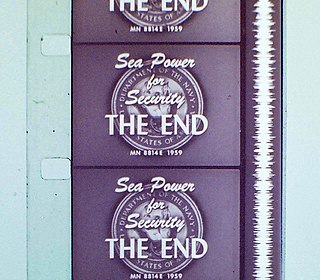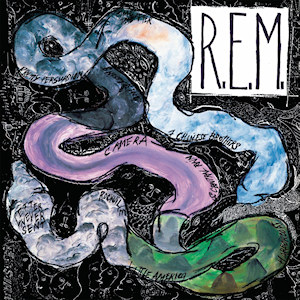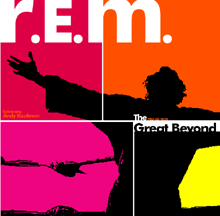| Look up in time in Wiktionary, the free dictionary. |
In time may refer to:
| Look up in time in Wiktionary, the free dictionary. |
In time may refer to:
| This disambiguation page lists articles associated with the title In time. If an internal link led you here, you may wish to change the link to point directly to the intended article. |

A soundtrack can be recorded music accompanying and synchronized to the images of a motion picture, book, television program, or video game; a commercially released soundtrack album of music as featured in the soundtrack of a film, video, or television presentation; or the physical area of a film that contains the synchronized recorded sound.
Romance may refer to:

John Michael Stipe is an American singer-songwriter best known as the lead singer and lyricist of alternative rock band R.E.M. throughout its history. He is known for his distinctive vocal quality, poetic lyrics and unique stage presence.

"Losing My Religion" is a song by the American alternative rock band R.E.M. The song was released as the first single from the group's 1991 album Out of Time. Built on a mandolin riff, "Losing My Religion" was an unlikely hit for the group, garnering extensive airplay on radio as well as on MTV and VH1 due to its critically acclaimed music video. The song became R.E.M.'s highest-charting hit in the United States, reaching No. 4 on the Billboard Hot 100 and expanding the group's popularity beyond its original fanbase. At the 1992 Grammy Awards, "Losing My Religion" won two awards: Best Short Form Music Video and Best Pop Performance by a Duo or Group with Vocal.

Out of Time is the seventh studio album by American alternative rock band R.E.M., released on March 12, 1991 by Warner Bros. Records. With Out of Time, R.E.M.'s status grew from that of a cult band to a massive international act. The record topped the album sales charts in both the United States and the United Kingdom, spending 109 weeks on U.S. album charts and enjoying two separate spells at the summit, and spending 183 weeks on the British charts and a single week at the top. The album has sold more than four and a half million copies in the United States and more than 18 million copies worldwide. The album won three Grammy Awards in 1992: one as Best Alternative Music Album, and two for the first single, "Losing My Religion."

Monster is the ninth studio album by American rock band R.E.M., released on September 27, 1994 by Warner Bros. Records. Produced by the band and Scott Litt and recorded at four studios, the album was an intentional stylistic shift from R.E.M.'s previous two albums Out of Time (1991) and Automatic for the People (1992), with loud, distorted guitar tones and simple arrangements. Michael Stipe's lyrics at times deal with the nature of celebrity, and some are sung from the viewpoint of a character.

Reckoning is the second studio album by American alternative rock band R.E.M., released on April 9, 1984 by I.R.S. Records. Produced by Mitch Easter and Don Dixon, the album was recorded at Reflection Sound Studio in Charlotte, North Carolina, over 16 days in December 1983 and January 1984. Dixon and Easter intended to capture the sound of R.E.M.'s live performances, and used binaural recording on several tracks. Lead singer Michael Stipe dealt with darker subject matter in his lyrics, with water-related imagery being a recurring theme on the album.

In Time: The Best of R.E.M. 1988–2003 is the second official compilation album released by R.E.M. Issued in 2003, it includes tracks from their Warner Bros. Records era, from 1988's Green to 2001's Reveal, as well as two new recordings and two songs from movie soundtracks. The album was the tenth-best-selling album of 2003 in the UK, and the 50th-best-selling album of the 2000s in the UK.

Lifes Rich Pageant is the fourth studio album by the American alternative rock band R.E.M., released on July 28, 1986. R.E.M. chose Don Gehman to produce the album, which was recorded at John Mellencamp's Belmont Mall Studios in Belmont, Indiana. This was the only album the band recorded with Gehman, who moved them from the more obscure and dense sound of their earlier albums to an accessible, hard rock-influenced quality. The album was well-received critically.

"The Great Beyond" is a song by R.E.M. written specifically for the 1999 film Man on the Moon. It was released as a single the following year for support of the film's soundtrack album. On the soundtrack, there is some dialogue from the movie at the end of the track; meanwhile, the single version is a radio edit, with the bridge omitted.

John Roger Stephens, known professionally as John Legend, is an American singer, songwriter, record producer, actor, film producer, theatre director, and philanthropist. Prior to the release of Legend's debut album, Get Lifted (2004), he had collaborated with already established artists and signed to Kanye West's GOOD Music. Legend has sung on Jay-Z's "Encore", Alicia Keys's "You Don't Know My Name", Dilated Peoples' "This Way", Slum Village's "Selfish", Fort Minor's "High Road", and played piano on Lauryn Hill's "Everything Is Everything". Legend's single "All of Me" from his fourth studio album Love in the Future (2013) was a Billboard Hot 100 number-one hit.

Tevin Jermod Campbell is an American singer, songwriter and actor. He performed gospel in his local church from an early age. Following an audition for jazz musician, Bobbi Humphrey, in 1988, Campbell was signed to Warner Bros. Records. In 1989, Campbell collaborated with Quincy Jones performing lead vocals for "Tomorrow" on Jones' album "Back on the Block" and released his Platinum-selling debut album, T.E.V.I.N.. The album included his highest-charting single to date, "Tell Me What You Want Me to Do", peaking at number 6 on the Billboard Hot 100. The debut album also included the singles "Alone With You", and "Goodbye".

"Everybody Hurts" is a song by American rock band R.E.M., originally released on the band's 1992 album Automatic for the People and also released as a single in 1993. It peaked at number 29 on the US Billboard Hot 100 and reached the top 10 on the charts of Australia, Canada, France, Iceland, the Netherlands, the Republic of Ireland and the United Kingdom. In 2003, Q magazine ranked "Everybody Hurts" at number 31 in their list of the "1001 Best Songs Ever". And in 2005, Blender ranked the song at number 238 in their list of "Greatest Songs Since You Were Born".

"Man on the Moon" is a song by the American alternative rock band R.E.M., released as the second single from their 1992 album Automatic for the People. The lyrics were written by lead singer Michael Stipe, and the music by drummer Bill Berry and guitarist Peter Buck, and credited to the whole band as usual. The song was well received by critics and peaked at number 30 on the US Billboard Hot 100, number 18 on the UK Singles Chart and number one in Iceland. It remains one of R.E.M.'s most popular songs and was included on the compilations In Time: The Best of R.E.M. 1988–2003 and Part Lies, Part Heart, Part Truth, Part Garbage 1982–2011.

"It's the End of the World as We Know It " is a song by American rock band R.E.M., which first appeared on their 1987 album Document. It was released as the album's second single in November 1987, reaching No. 69 in the US Billboard Hot 100 and later reaching No. 39 on the UK Singles Chart on its re-release in December 1991.

"Fall on Me" is a song by the American alternative rock band R.E.M. from their fourth album Lifes Rich Pageant (1986). It was the first of two singles released from that LP. It peaked at number 94 on the Billboard Hot 100. The song was one of the band's early compositions about environmentalism, discussing acid rain. It also transitioned from their murky lyrics and jangling guitar of their first three albums to a more accessible sound influenced by producer Don Gehman.

Between 1981 and 2011, American alternative rock band R.E.M. released 15 studio albums, four live albums, 14 compilation albums, one remix album, one soundtrack album, 12 video albums, seven extended plays, 63 singles, and 77 music videos. Formed in 1980 by singer Michael Stipe, guitarist Peter Buck, bassist Mike Mills, and drummer Bill Berry, the band was pivotal in the development of the alternative rock genre. Their musical style inspired several other alternative rock bands and musicians, and the band became one of the first alternative rock acts to experience breakthrough commercial success. R.E.M. have sold more than 85 million albums worldwide, making them one of the best-selling music artists of all time.

"Drive" is a song by American alternative rock band R.E.M. It was the first track on and the lead single from their eighth studio album Automatic for the People in 1992, and it was the first song lead singer Michael Stipe wrote on a computer. Although not as commercially successful as previous lead singles "Losing My Religion," "Stand," or "The One I Love" in the United States, it managed to peak at number 28 on the Billboard Hot 100, number one on the Modern Rock Tracks chart, and number two on the Album Rock Tracks chart. Internationally, "Drive" became R.E.M.'s then second-biggest hit on the UK Singles Charts, peaking at number 11, and their biggest hit in Norway until "Supernatural Superserious" in 2008, reaching number three. Elsewhere, the song reached the top 10 in Canada, Ireland, New Zealand, Poland and Switzerland.

R.E.M. was an American rock band from Athens, Georgia, formed in 1980 by drummer Bill Berry, guitarist Peter Buck, bassist Mike Mills, and lead vocalist Michael Stipe who were students at the University of Georgia. Liner notes from some of the band's albums list attorney Bertis Downs and manager Jefferson Holt as non-musical members. One of the first alternative rock bands, R.E.M. was noted for Buck's ringing, arpeggiated guitar style; Stipe's distinctive vocal quality, unique stage presence, and obscure lyrics; Mills's melodic bass lines and backing vocals; and Berry's tight, economical drumming style. In the early 1990s, other alternative rock acts such as Nirvana and Pavement viewed R.E.M. as a pioneer of the genre. After Berry left the band in 1997, the band continued its career in the 2000s with mixed critical and commercial success. The band broke up amicably in 2011 with members devoting time to solo projects after having sold more than 85 million albums worldwide and becoming one of the world's best-selling music artists.

Green is the sixth studio album by American rock band R.E.M., released on November 7, 1988 by Warner Bros. Records. Produced by the band and Scott Litt, it continued to explore political issues both in its lyrics and packaging. The band experimented on the album, writing major-key rock songs and incorporating new instruments into their sound including the mandolin, as well as switching their original instruments on other songs.